Advertisement
Harvard confronts fear and division a month into Gaza conflict
Tensions on Harvard’s campus remain high as the conflict in the Gaza Strip enters its second month. The flurry of activism set off by the fighting — and ongoing backlash to both student demonstrations and messaging from university leadership — has kept the school community on edge.
Current students at Harvard Law School tell WBUR they and other classmates critical of Israel have seen job offers revoked or endangered as a result of their activism; others say harassment tied to their pro-Palestinian speech has intimidated their parents and siblings.
On several evenings in the past month and during planned protests, Harvard Yard — normally open to the public — has closed its gates to all but university ID holders.
Dispatches from university leadership have enraged some donors, with several severing ties with the institution. One — the Wexner Foundation — cited administrators’ “dismal failure” to stand against Hamas, while other groups have pointed to an alleged rise in antisemitism on campus.
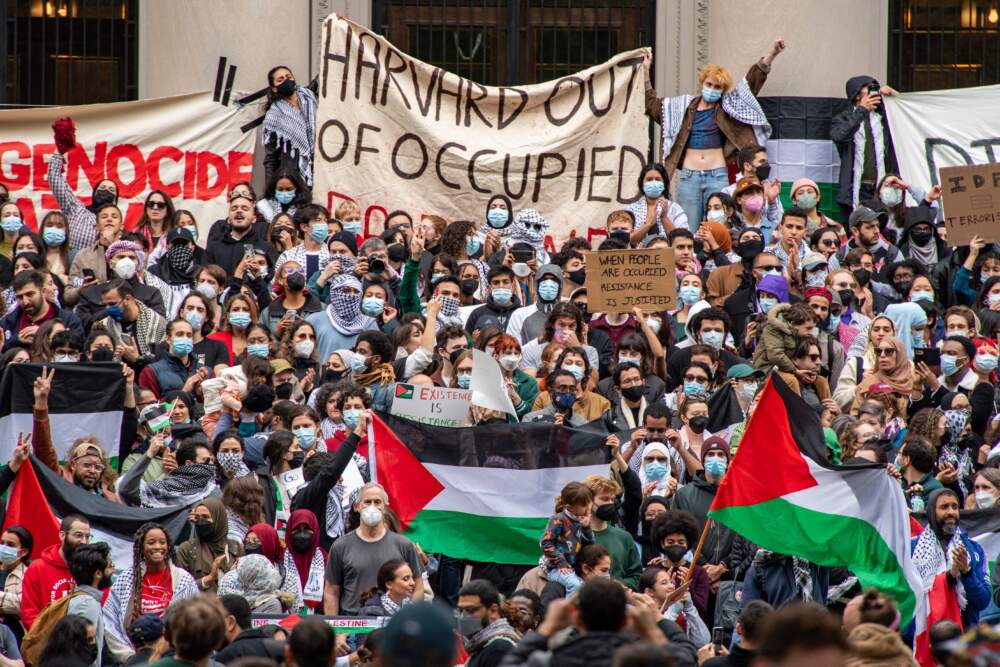
The war has been a flashpoint at hundreds of universities across the United States. But Harvard stands out, owing to controversy over how quickly students released public statements of support for Palestinians in the wake of the Hamas attack, as well as the university’s status as one of the wealthiest in the world, with an endowment over $50 billion.
The turmoil has raised questions about how a university can, or should, accommodate a broad and diverse array of stakeholders, including students, staff, donors and alumni, during a moment of collective anguish.
“This is kind of a no-win situation for college administrators,” said Peter Bonilla, head of the Free Speech Alliance at M.I.T. “When donors are throwing their weight around — and then university leaders backtrack on statements or issue subsequent statements — it gives the impression of working from a position of weakness.”
Advertisement
Donors speak out
A statement by Harvard’s Palestine Solidarity Committee, published hours after the Oct. 7 attacks, first put the university in the spotlight. Signed at first by over 30 student groups, that statement struck a nerve with some over its strident tone – and for holding “the Israeli regime entirely responsible for all unfolding violence.”
After some criticized her own initial statement as delayed and tepid, Claudine Gay — Harvard’s president since July — issued a more forceful follow-up, writing that “no student group … speaks for Harvard University or its leadership,” while condemning Hamas’ “terrorist atrocities.”
The university has since launched two task forces: one to address the harassment of mostly students with pro-Palestinian views, and another to address antisemitism on Harvard’s campus.
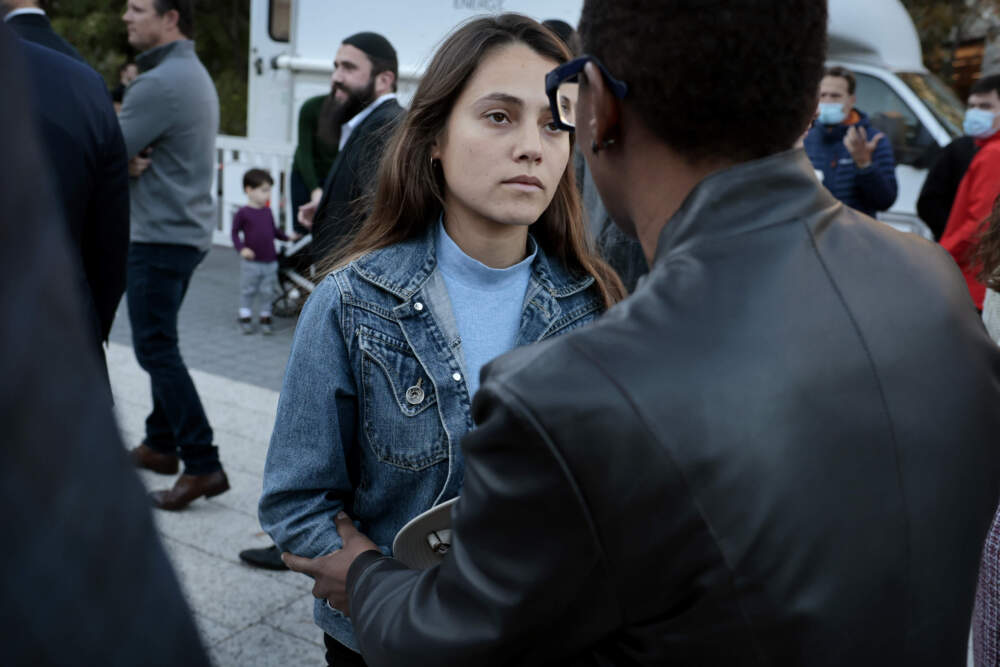
In an email sent to the Harvard community Thursday, Gay announced new university steps to “combat antisemitism,” developed in consultation with the latter task force.
Among them, Gay said there would be “a robust program of education and training for students, faculty, and staff on antisemitism broadly and at Harvard specifically,” but did not share what form that education might take.
Later in the email, Gay explicitly condemned the phrase, “from the river to the sea,” a decades-old, pro-Palestinian chant that, she wrote, “to a great many people impl[ies] the eradication of Jews from Israel.”
Some Jewish students at Harvard said they do bristle at that chant, sometimes heard over megaphones at protests on campus.
But Palestinians — including Congresswoman Rashida Tlaib (D-Mich.), recently censured for using the phrase — have long argued that it has an emancipatory, and not a violent, meaning.
It remains to be seen whether Gay's steps will reassure alumni and donors who have expressed displeasure with the university’s response so far.
On Oct. 23, a group led by billionaire investor Seth Klarman, philanthropist Joanna Jacobson and former Mass. governor and Sen. Mitt Romney (R-Utah) drafted an open letter to Harvard administrators, accusing them of standing by amid a “meteoric rise in antisemitism” on campus and claiming that “Jewish students have locked themselves in dorm rooms across your campuses afraid for their own safety.”
Harvard officials declined to comment on the letter, which attracted over 2,500 alumni signatures in two weeks.
"This is kind of a no-win situation for college administrators."
Peter Bonilla
The lead signatories — all prominent Harvard Business School alumni — asked administrators to develop a mandatory course on critical thinking, and to ban unscheduled protests. They also asked that protesters be barred from covering their faces, and that university property close to the public during protests.
In the days before receiving the letter, Harvard officials had already implemented that last recommendation, barring those without university IDs from Harvard Yard during at least two October demonstrations.
Several of the letter’s lead signatories have made significant financial contributions to the university in recent years.
For instance, federal tax filings show that the Klarman Family Foundation contributed at least $80.3 million to the university and related institutions between 2001 and 2021. Other lead signatories have made seven-figure gifts of their own.
Despite endorsing the letter, none of the lead signatories has yet formally severed their philanthropic relationships with Harvard.
But others have. Israeli billionaire Idan Ofer and his wife resigned from the board of Harvard’s Kennedy School of Government in mid-October, and Les Wexner — the founder of L Brands — ended a long-running fellowship for Israeli civil servants also at the Kennedy School.
At Harvard and other universities, donors are officially instructed not to expect anything in return for their gifts.
But as private giving to American universities has grown dramatically in recent decades, so have donor efforts to influence school policies, according to Lila Corwin Berman, a historian of philanthropy at Temple University.
“We’ve seen it over and over,” Berman said. For example, in 2019, a prospective gift to the University of North Carolina was withdrawn over the university’s plans to preserve a Confederate monument, while in 2021 historian Beverly Gage stepped down from a directorship at Yale University citing pressure from conservative donors.
Private philanthropists are well within their rights to criticize their beneficiary institutions, to end their support, and to take part in many “conversations” about institutional direction, Berman said.
Where donor influence “becomes indefensible,” she added, is when it serves to restrict open dialogue on campus or otherwise distort the “essential mission” of American universities.
Fear and 'fracturing'
Since the eruption of the Israel-Gaza war, universities have had to determine if and when heated political disagreement becomes a public safety concern.
At Brandeis University, hours before a planned vigil Monday, the school’s chapter of Students for Justice in Palestine saw its charter revoked by administrators. University President Ron Liebowitz argued administrators can move to restrict “expression… that constitutes a genuine threat or harassment.” Days earlier, at UMass Amherst, a student was arrested for assaulting a Jewish classmate at a demonstration.
In interviews, nearly a dozen Jewish students at Harvard mentioned very few instances of feeling personally or physically threatened since Oct. 7. But many did share a deep and painful sense of anger and isolation.
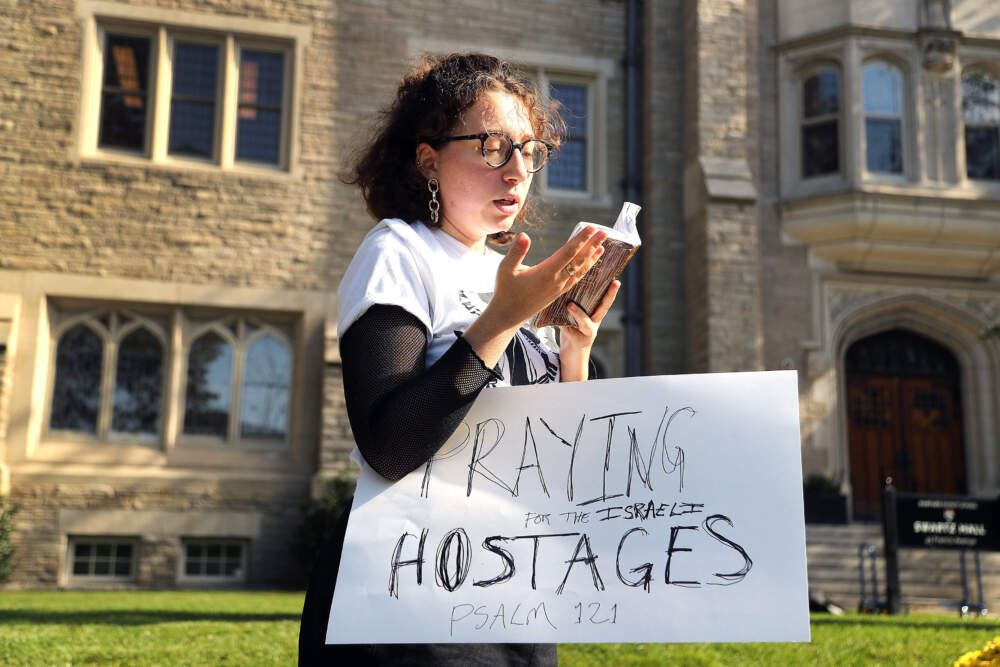
Nearly all were troubled by the Palestine Solidarity Committee’s Oct. 7 statement. At a Harvard Hillel webinar on Nov. 2, Jacob Miller — the group’s president — called that statement “beyond the pale'' and “extremely antisemitic.”
Since then, Jewish and Israeli students and their allies have gathered to honor those killed by Hamas at vigils. Most recently, this past Friday, Harvard Yard played host to a Shabbat dinner table surrounded by over 200 empty seats — a tribute to hostages inside Gaza.
All the while, Harvard has also seen a number of walkouts, rallies and vigils in opposition to Israel’s bombing of Gaza — which has now killed over 10,000 people, most of them women and children — as well as of the occupation of Palestinian territories.
Amelia Spalter, a student at the Harvard Graduate School of Education, said she asked several administrators – to no avail – to move a planned Nov. 1 event off-campus, and alleging that organizers used “antisemitic rhetoric” as they encouraged classmates to attend.
Spalter said a sense of indifference from the university has left her and many Jewish classmates feeling “materially unsafe” at Harvard – and changing their behavior accordingly: “I have two locks on my door. I only ever used to lock one. I lock them both now.”
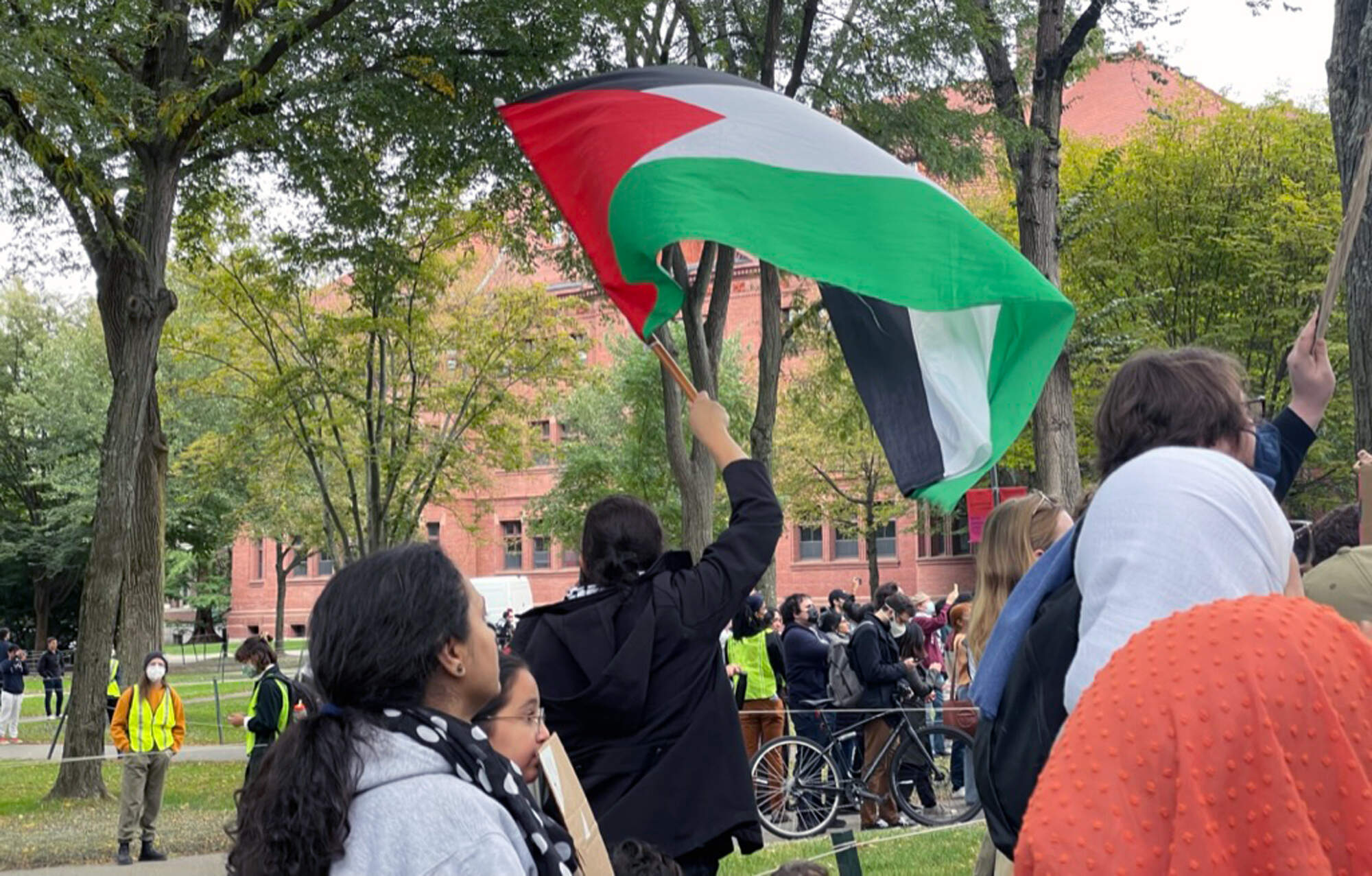
Meanwhile, students who have spoken up for Palestinians or for a ceasefire have faced personal and professional problems.
A “doxxing truck” showing pro-Palestinian students’ faces and names — hired by a conservative group — was stationed near Harvard’s campus and has more recently surfaced in front of the family homes of at least two students in Massachusetts and Vermont.
Texts and emails reviewed by WBUR show at least one student at Harvard Law School reporting the loss of a prospective post-graduation job due, they write, to the “lack of judgment” associated with their pro-Palestinian activism. Another has been placed under investigation by a prospective employer for a similar reason.
Some Jewish graduate students who have opposed Israel’s bombing campaign at protests and in public statements say they too have been harassed.
Shir and Miriam are members of Harvard’s “Jews for Liberation,” a campus group for “anti-Zionist and non-Zionist” Jewish students. After speaking at pro-Palestinian vigils in October, Shir was quickly named in conservative media and started receiving threatening emails, apparently from outside the Harvard community. WBUR agreed not to use those students’ last names in light of the threats and harassment they’ve already received.
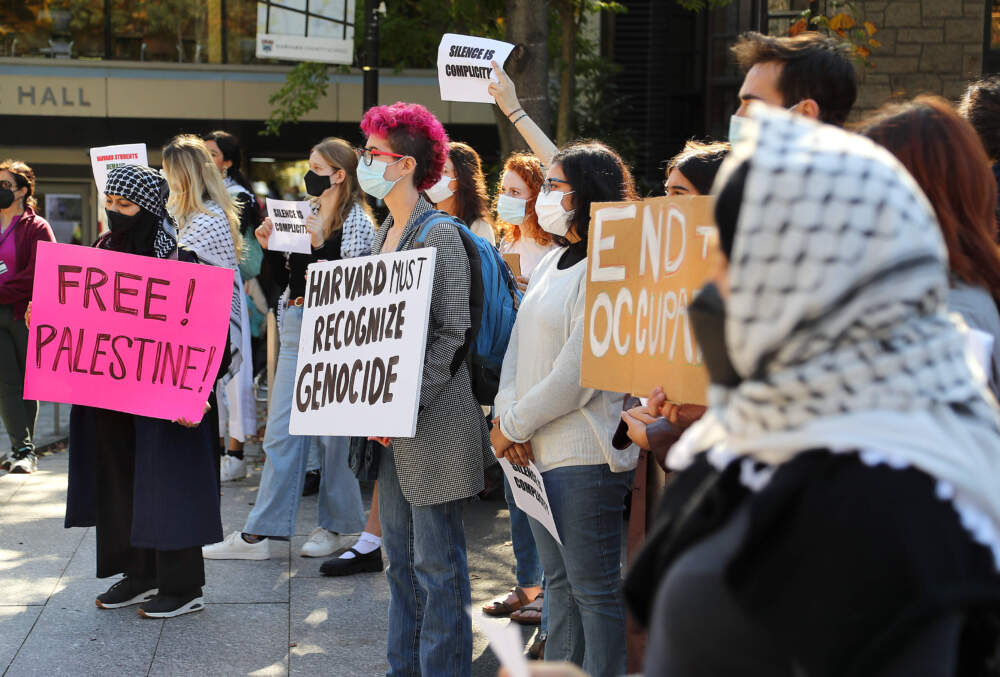
Miriam said, for her, this moment reveals “a fracturing within the Jewish world” over how and whether to identify with the state of Israel.
In 2020, Gallup found that fewer than half of American Jewish respondents between 18 and 29 “felt very or somewhat attached to Israel,” compared to two-thirds of those age 65 and older.
More recently, an NPR/PBS poll conducted on Oct. 11 found that, among Americans of younger generations, support for Israel’s ongoing military effort is dramatically lower.
The university response
In her statements, Gay has sought to articulate a balanced institutional stance: against anti-Jewish bigotry and also against the harassment of student activists, protecting “free expression” alongside the “physical safety and security of others.”
But some worry that as universities like Harvard seek to promote mutual tolerance and safety, they may place other core values at risk.
Kenneth Roth, a senior fellow at the Carr Center for Human Rights at Harvard’s Kennedy School, said occasional feelings of “emotional unsafety” are not only unavoidable, but essential to a successful education.
“Administrators should try to stop violence, intimidation, harassment — those are genuine concerns,” said Roth, who ran Human Rights Watch for 19 years. But Roth suggested that the environment at Harvard has not often crossed that line.
“If students are saying they don’t feel safe because … they’re hearing views that they don’t like, the answer to that, frankly, should be ‘grow up,’ ” Roth said.
Roth told WBUR he still believes his own Harvard appointment was briefly blocked by donors or others, due to his past criticism of Israel, earlier this year. The Kennedy School’s dean reversed his decision a week later, calling his initial choice “an error” and denying that it was influenced by donors.
“If students are saying they don’t feel safe because … they’re hearing views that they don’t like, the answer to that, frankly, should be ‘grow up.’ ”
Kenneth Roth
Universities’ “well-meaning” urge to comment on world events, Roth says, leaves them open to donor dissatisfaction with what they say. He suggested administrators instead resume a single-minded defense of academic freedom, as outlined by a famous University of Chicago report published during the Vietnam War.
But others, like Berman, the Temple University historian, say silence may no longer be an option for school leaders.
Since 1967, Berman said, universities have transformed into some of the nation’s most prominent and wealthiest institutions — thanks in large part to the donors now giving them nearly $60 billion a year.
With thousands of students and staff, she added, “they are leaders … in a polarized political environment — and people do look to them to say things that meet the moment.”
Berman also stressed that this fall’s focus on “ugly moments” on campus may overlook a quieter, healthier part of American higher education.
In her classroom at Temple, Berman said, students are “mainly asking questions, mainly expressing frustration that they’re expected to pick a side” in the conflict.
Those questions and frustrations are playing out at Harvard, too – in classes, in social spaces, and even in the experiences of individual students.
“I love being a Jew,” said senior Jeremy Ornstein, “I want Israel to exist — and thrive.” At the same time, he said, he can’t ignore “that the people, the children of Gaza, are being bombed.”
Ornstein says he has himself been bruised by casually antisemitic jokes and statements during his time at Harvard. But he worries that pain and sensitivity, however reasonable, can become an obstacle to growth, learning and community.
“It’s disappointing when we make ourselves so fragile that we can't have conversations in which we take accountability,” he said. “We can close our eyes to the harm we're doing — because we're so afraid.”
